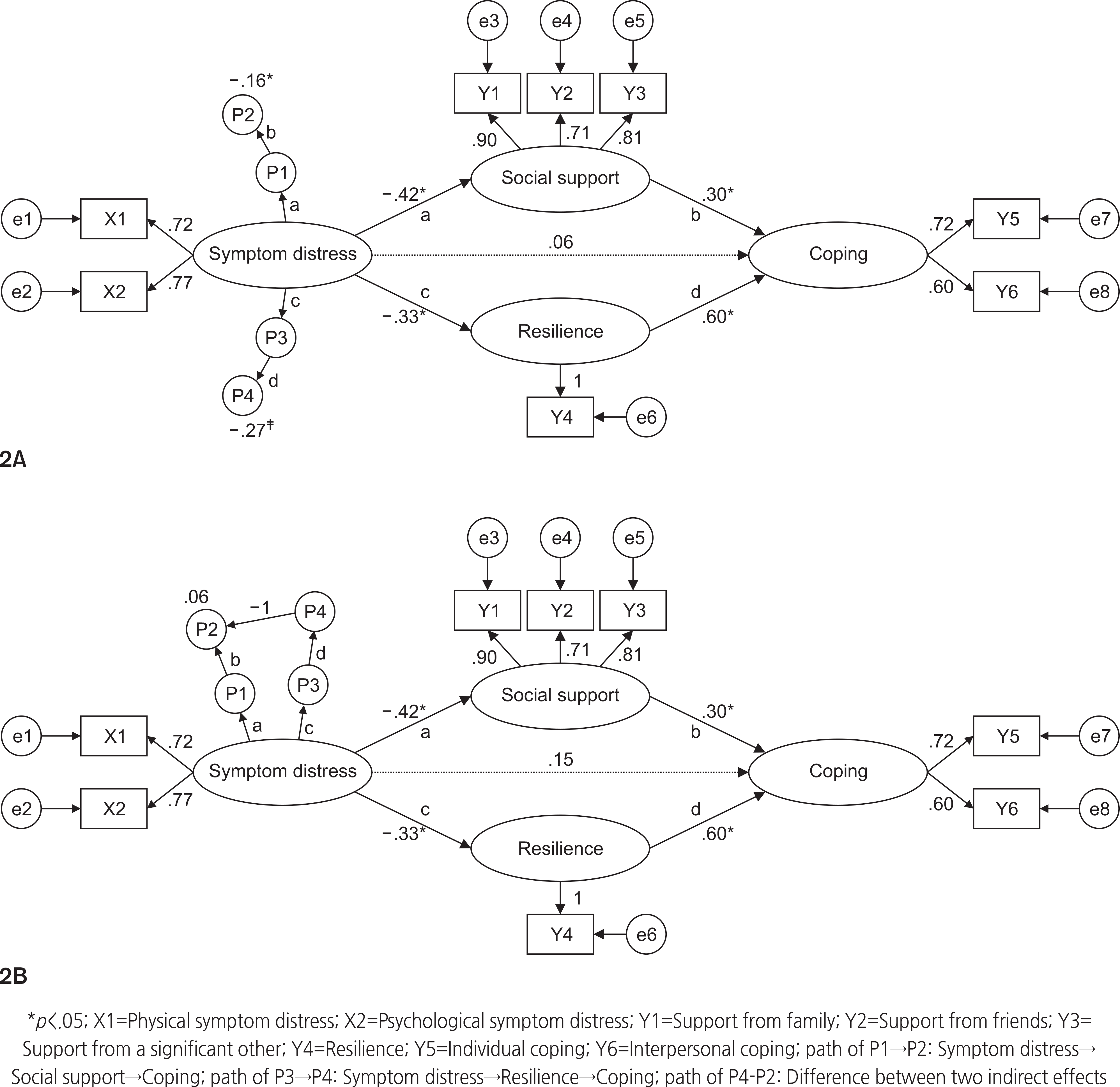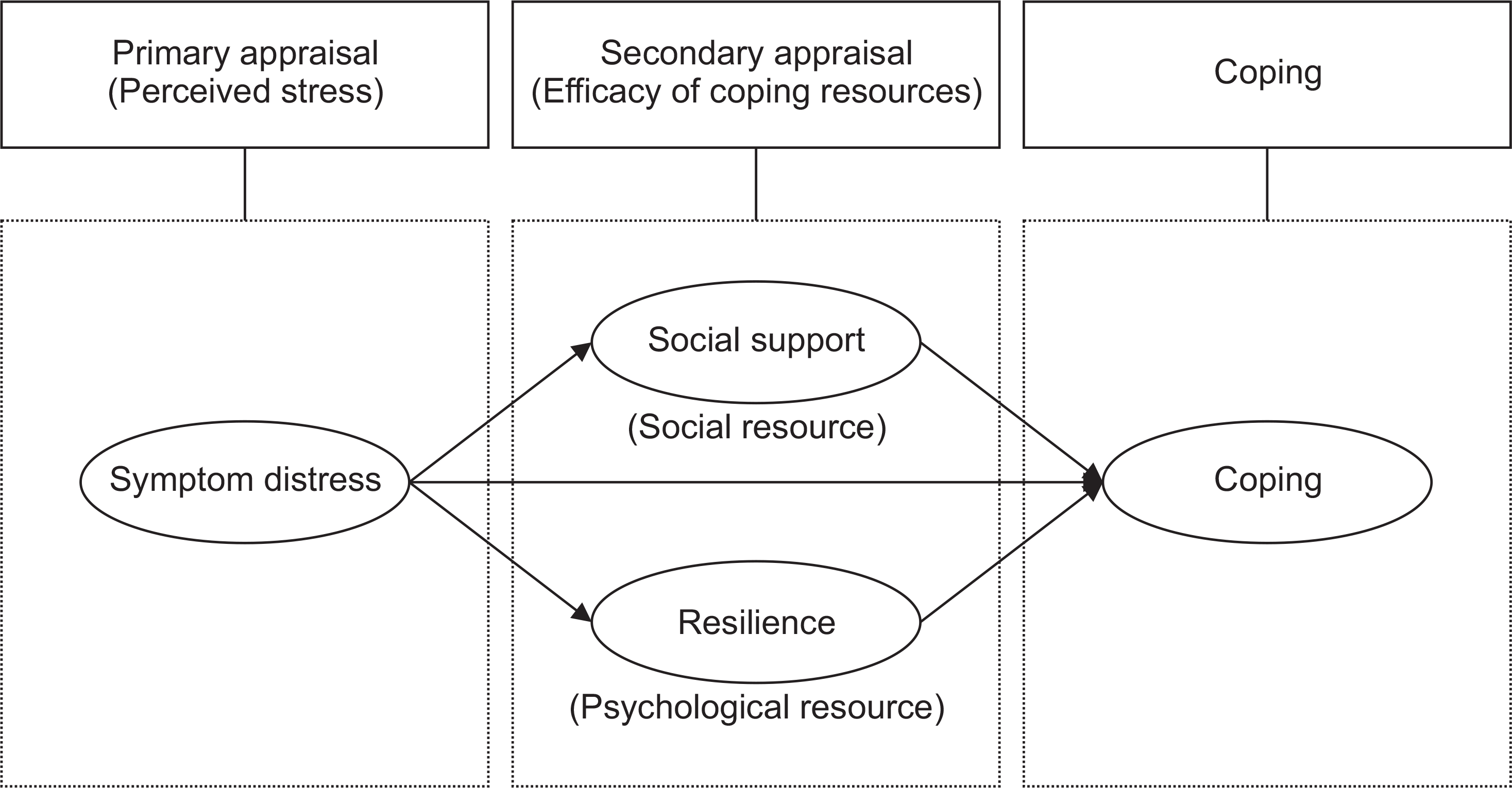Abstract
Purpose
The purpose of this study was to test the mediating effect of social support and resilience on the relationship between symptom distress and coping in young Korean breast cancer survivors.
Methods
A purposive sample of 209 young breast-cancer survivors (mean age 39.9) was recruited for a cross-sectional survey, and the data were collected between June and October 2015. The instruments used in this study were the Memorial Symptom Assessment Scale-Short Form, the Multidimensional Scale of Perceived Social Support, 10-item Connor-Davidson Resilience Scale, and Cancer Coping Questionnaire. The collected data were then analyzed using the SPSS 23.0 and AMOS 23.0 programs.
Results
Symptom distress was found to have a significant indirect effect on coping (beta=-.32, p=.002), but not a significant direct effect (beta=.06, p=.577). Additionally, based on the values obtained for the squared multiple correlation, symptom distress, social support, and resilience were found to explain 46.4% of the total variance of coping.
Go to : 
References
1. Korean Breast Cancer Society. Breast cancer facts & figures 2016 [Internet]. Seoul: Korean Breast Cancer Society;c2017. [cited 2017 Apr 15]. Available from:. http://www.kbcs.or.kr./sub02/sub04.html.
2. Christophe V, Duprez C, Congard A, Antoine P, Lesur A, Fournier E, et al. The subjective experience of young women with non-metastatic breast cancer: The Young Women with Breast Cancer Inventory. Health and Quality of Life Outcomes. 2015; 13:73. https://doi.org/10.1186/s12955-015-0273-x.

3. Champion VL, Wagner LI, Monahan PO, Daggy J, Smith L, Cohee A, et al. Comparison of younger and older breast cancer survivors and age-matched controls on specific and overall quality of life domains. Cancer. 2014; 120(15):2237–2246. https://doi.org/10.1002/cncr.28737.

4. Duffy CM, Allen SM, Clark MA. Discussions regarding reproductive health for young women with breast cancer undergoing chemotherapy. Journal of Clinical Oncology. 2005; 23(4):766–773. https://doi.org/10.1200/jco.2005.01.134.

5. Avis NE, Crawford S, Manuel J. Quality of life among younger women with breast cancer. Journal of Clinical Oncology. 2005; 23(15):3322–3330. https://doi.org/10.1200/jco.2005.05.130.

6. Pauwels EE, Charlier C, De Bourdeaudhuij I, Lechner L, Van Hoof E. Care needs after primary breast cancer treatment. Survivors’ associated sociodemographic and medical characteristics. Psycho-Oncology. 2013; 22(1):125–132. https://doi.org/10.1002/pon.2069.

7. Khalili N, Farajzadegan Z, Mokarian F, Bahrami F. Coping strategies, quality of life and pain in women with breast cancer. Iranian Journal of Nursing and Midwifery Research. 2013; 18(2):105–111.
8. Lazarus RS, Folkman S. Stress, appraisal, and coping. 1st Engl. Ed.Kim JH, translator. Seoul: DaeKwang Moon Hwa Sa Publishing Co.;1991. p. 46–206.
9. Jung DW. Psychosocial stress. Paju: Korean Studies Information;2010. p. 25–163.
10. Arora NK, Finney Rutten LJ, Gustafson DH, Moser R, Hawkins RP. Perceived helpfulness and impact of social support provided by family, friends, and health care providers to women newly diagnosed with breast cancer. Psycho-Oncology. 2007; 16(5):474–486. https://doi.org/10.1002/pon.1084.

11. Chou AF, Stewart SL, Wild RC, Bloom JR. Social support and survival in young women with breast carcinoma. Psycho-Oncology. 2012; 21(2):125–133. https://doi.org/10.1002/pon.1863.

12. Waugh CE, Fredrickson BL, Taylor SF. Adapting to life’s slings and arrows: Individual differences in resilience when recovering from an anticipated threat. Journal of Research in Personality. 2008; 42(4):1031–1046. https://doi.org/10.1016/j.jrp.2008.02.005.

13. Fradelos EC, Papathanasiou IV, Veneti A, Daglas A, Christodoulou E, Zyga S, et al. Psychological distress and resilience in women diagnosed with breast cancer in Greece. Asian Pacific Journal of Cancer Prevention. 2017; 18(9):2545–2550. https://doi.org/10.22034/APJCP.2017.18.9.2545.
14. Yoo GJ, Sudhakar A, Le MN, Levine EG. Exploring coping strategies among young Asian American women breast cancer survivors. Journal of Cancer Education. 2015; 32(1):43–50. https://doi.org/10.1007/s13187-015-0917-x.

15. Thomsen TG, Rydahl-Hansen S, Wagner L. A review of potential factors relevant to coping in patients with advanced cancer. Journal of Clinical Nursing. 2010; 19(23-24):3410–3426. https://doi.org/10.1111/j.1365-2702.2009.03154.x.

16. Kang JY, Suh EE. The influence of stress, spousal support, and resilience on the ways of coping among women with breast cancer. Asian Oncology Nursing. 2015; 15(1):1–8. https://doi.org/10.5388/aon.2015.15.1.1.

17. Kim HY, So HS. A structural model for psychosocial adjustment in patients with early breast cancer. Journal of Korean Academy of Nursing. 2012; 42(1):105–115. https://doi.org/10.4040/jkan.2012.42.1.105.

18. Fitch MI, Gray RE, Godel R, Labrecque M. Young women’s experiences with breast cancer: An imperative for tailored information and support. Canadian Oncology Nursing Journal. 2008; 18(2):74–79. https://doi.org/10.5737/1181912x1827479.

19. Moyer A, Salovey P. Predictors of social support and psychological distress in women with breast cancer. Journal of Health Psychology. 1999; 4(2):177–191. https://doi.org/10.1177/135910539900400212.

20. Lynn MR. Determination and quantification of content validity. Nursing Research. 1986; 35(6):382–385.

21. Hair JF, Black WC, Babin BJ, Anderson RE. Multivariate data analysis. 7th ed. Upper Saddle River (NJ): Pearson Prentice Hall;2010. p. 578–581.
22. Bae BR. Structural equation modeling with Amos 21: Principles and practice. Seoul: Chungram publishing Co.;2014. p. 322–447.
23. Chang VT, Hwang SS, Feuerman M, Kasimis BS, Thaler HT. The memorial symptom assessment scale short form (MSAS-SF). Cancer. 2000; 89(5):1162–1171. https://doi.org/10.1002/1097-0142(20000901)89:5<1162::aid-cncr26>3.0.co;2-y.

24. World Health Organization. Process of translation and adaptation of instruments [Internet]. Geneva: World Health Organization;c2015. [cited 2015 Apr 20]. Available from:. http://www.who.int/substance_abuse/research_tools/translation/en/.
25. Zimet GD, Dahlem NW, Zimet SG, Farley GK. The multidimensional scale of perceived social support. Journal of Personality Assessment. 1988; 52(1):30–41. https://doi.org/10.1207/s15327752jpa5201_2.

26. Shin JS, Lee YB. The effects of social supports on psychosocial well-being of the unemployed. Korean Journal of Social Welfare. 1999; 37:241–269.
27. Connor KM, Davidson JR. Development of a new resilience scale: The Connor-Davidson resilience scale (CD-RISC). Depression and Anxiety. 2003; 18(2):76–82. https://doi.org/10.1002/da.10113.

28. Moorey S, Frampton M, Greer S. The Cancer Coping Questionnaire: A self-rating scale for measuring the impact of adjuvant psychological therapy on coping behaviour. Psycho-Oncology. 2003; 12(4):331–344. https://doi.org/10.1002/pon.646.

29. Kim JN, Kwon JH, Kim SY, Yu BH, Hur JW, Kim BS, et al. Validation of Korean-cancer coping questionnaire (K-CCQ). Korean Journal of Health Psychology. 2004; 9(2):395–414.
30. Thewes B, Butow P, Girgis A, Pendlebury S. The psychosocial needs of breast cancer survivors; A qualitative study of the shared and unique needs of younger versus older survivors. Psycho-Oncology. 2004; 13(3):177–189. https://doi.org/10.1002/pon.710.

31. Loprinzi CE, Prasad K, Schroeder DR, Sood A. Stress Management and Resilience Training (SMART) program to de- crease stress and enhance resilience among breast cancer survivors: A pilot randomized clinical trial. Clinical Breast Cancer. 2011; 11(6):364–368. https://doi.org/10.1002/pon.646.
32. Zhu J, Ebert L, Liu X, Chan SW. A mobile application of breast cancer e-support program versus routine care in the treatment of Chinese women with breast cancer undergoing chemotherapy: Study protocol for a randomized controlled trial. BMC Cancer. 2017; 17(1):291. https://doi.org/10.1186/s12885-017-3276-7.

Go to : 
 | Figure 2.Differential verification after analysis of multiple mediator model using phantom variable. (A) Specific indirect effects in multi-mediation model, including phantom variables. (B) Verification of the difference between two indirect effects in a multi-mediation model involving phantom variables. |
Table 1.
Confirmatory Factor Analysis of the Research Measurements
Table 2.
Descriptive Statistics of the Research Variables (N=209)
Table 3.
Parameter Statistics for the Final Model and the Direct, Indirect, and Total Effect of the Final Model (N=209)




 PDF
PDF ePub
ePub Citation
Citation Print
Print



 XML Download
XML Download